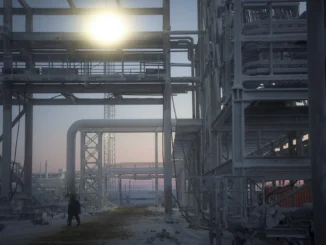
Weekly Daily Standup Top Stories
Now that Bill Gates has said that Climate Change is not our biggest existential threat to Humanity, how much money has he cost the global markets?
Charles Payne from Fox on Gutfield hits it out of the park.
Illinois Gov Pritzker to Approve Bill Calling for 3 GW of Battery Storage by 2030 – But How Much Will They Lower Electricity Prices Remains to Be Seen
In a move poised to reshape Illinois’ energy landscape, Governor JB Pritzker is set to sign the Clean and Reliable Grid Affordability (CRGA) Act, a sweeping energy reform package passed by the state legislature in […]
Wind Not Blowing in Germany as Wind Output Hits Yearly Low After Record October
Germany’s ambitious push toward renewable energy has long been hailed as a model for the world, but recent developments underscore the vulnerabilities inherent in relying heavily on weather-dependent sources like wind and solar. Just days […]
Ørsted Racks Up A Massive $262 Million Q3 Loss Facing Head Winds as Offshore Challenges Roll In – How will Investors React?
In a stark reminder of the turbulent seas facing the renewable energy sector, Danish offshore wind giant Ørsted has reported a significant net loss for the third quarter of 2025, amounting to 1.7 billion Danish […]
What Can COP30 Accomplish in the Wake of Bill Gates’ Admission That Climate Change Is Not an Existential Threat?
As the world gears up for the 30th United Nations Climate Change Conference (COP30) in Belém, Brazil, from November 10-21, 2025, the global conversation on climate action is undergoing a notable shift. Bill Gates, the […]
Highlights of the Podcast
00:00 – Intro
00:20 – Now that Bill Gates has said that Climate Change is not our biggest existential threat to Humanity, how much money has he cost the global markets?
04:35 – Illinois Gov Pritzker to Approve Bill Calling for 3 GW of Battery Storage by 2030 – But How Much Will They Lower Electricity Prices Remains to Be Seen
10:49 – Wind Not Blowing in Germany as Wind Output Hits Yearly Low After Record October
14:07 – Ørsted Racks Up A Massive $262 Million Q3 Loss Facing Head Winds as Offshore Challenges Roll In – How will Investors React?
17:23 – What Can COP30 Accomplish in the Wake of Bill Gates’ Admission That Climate Change Is Not an Existential Threat?
20:08 – Outro
Need Power For Your Data Center, Hospital, or Business?
– Get in Contact With The Show –
Video Transcription edited for grammar. We disavow any errors unless they make us look better or smarter.
Stuart Turley: [00:00:00] Now that Bill Gates has said that climate change is not our biggest existential threat to humanity, how much money has he cost the global markets? That and more on this weekend edition of the Energy Newsbeat Daily Standup. [00:00:12][12.2]
Stuart Turley: [00:00:20] Now that Bill Gates has said climate change is not our biggest existential threat to humanity, how much money has he cost the global markets? Holy cow, Batman. Charles Payne from Fox on Gutfeld hits it out of the park. I had a blast writing this article on theenergynewsbeat.substack.com. Michael, this was fantastic and a surprising pivot that sends ripples through the environmental and energy sectors. Microsoft co-founder Bill Gates recently declared that climate change, while a real issue, is not an existential threat to humanity. Holy cow, Batman. And then I saw Gutfeld the other day and I copied it and put it in here. This is huge. Key points. War on natural, on gas. Shut down the nuclear plants. Charles Payne. I absolutely love that man. He absolutely hits it out of the park and goes, hey, wait a minute, why are the Dems shutting down everything? And then he just goes on to goes, and he says, Michael, instead of the JD, what would Jesus do? He comes up with, what’s Greta gonna do? So I took it one step further and go, JDN, what will Greta do now? But let’s go through the rest of this stuff. And the Gates global influence on climate politics, I went ahead and tried to come up with some serious numbers and that man has absolutely eviscerated the global economy. We’re talking billions. The company acquired by carbon engineering for 1.1 billion in 2023 and plans to scale DAC globally. Direct air capture estimates the market could reach 150 billion annually. Who’s going to pay for all that direct air capture carbon taxes? How much is the carbon tax blue hockey costing consumers, Michael? That’s all in here. This is kind of fun. [00:02:20][119.5]
Michael Tanner: [00:02:20] No, I think you did a really, really great job of breaking this down. I mean, it was inevitable that Bill Gates was going to eventually come around to this. Now I think what’s fascinating is how public he came out and did this. And knowing a little bit about Bill Gates’ background, maybe some of the implications from some, you know, some lists that may or may not be floating out there. I find it really fascinating that he comes out and publicly state this. I mean, it’s one thing to change your mind in private and just say, Hey, I’m going to stop quietly, stop funding this type of stuff. But the fact that he goes and writes an op ed specifically talking about how it’s not an existential threat to humanity after exactly what you said spent the last 10 years, dumping billions of his own dollars in there, attempting to basically turn the entire climate change narrative into an apocalyptic story. I find it really interesting. And I don’t know if I quite have an answer to what his motive is other than there’s some motive here. There’s some unknown motive. We don’t know about why he’s doing this. Is he shifting into invest, wanting to invest in another project? Is he, you know, all the way and then all over Cuckoo land, is there some blackmail that’s going on? I don’t, no, I doubt it. Yeah. [00:03:31][71.3]
Stuart Turley: [00:03:31] Yeah, I think you’re onto something because Larry Fink has stepped away from ESG and ESG is now no longer used on BlackRock. You are onto something, Michael. I hadn’t even thought of that. [00:03:42][11.3]
Michael Tanner: [00:03:42] What, what is it? I don’t know. You, you talk a lot about his breakthrough energy ventures. Maybe he’s seeing it can’t raise money and he’s like, well, if it can raise money, I’ve got to be able to step out and do something else really interesting, but I find it extremely hilarious and he must, and he obviously knew he’s not dumb. He probably has some of the highest paid PR people in the country. He clearly knew he was going to get backlash and there was going be articles and we, he’s probably thought, man, the energy news podcast is going to have a real good laugh at my expense, which we are, so thanks Bill. But my question is, he knew the implications of this. I wish I could come on and give an answer about why he’s doing this. I don’t quite know that, but I guarantee in the next six months, it’ll come out. Mark this down. [00:04:25][42.4]
Stuart Turley: [00:04:25] Oh, absolutely. And anyway, we’re off and running. He’s probably Biden-esque. He has got somebody acting for him now. He is already been jailed. Who knows? Just kidding. This is the second favorite governor behind Governor Newsom. Illinois’s Governor Pritzker to approve bill calling for three gigawatt of battery storage by 2030. But how much will they lower the electricity prices remains to be seen. Michael, you can’t buy this kind of entertainment. I saw this on about 15 different articles. The Democrat side saying a storage facility is going to lower the prices, and the bill, which has declared both the House and the Senate in a heated debate, mandates the deployment of three gigawatts of battery storage. EES by 2030 alongside incentives for geothermal energy. Okay, so that’s how they snuck this in there, calling it lowering the energy prices there. But the bill provisions batteries at the center, the CRGA, which is the Clean and Reliable Grid Affordability Act is almost as brilliantly named as the Inflation Reduction Act. The inflation reduction act did absolutely nothing to do anything with inflation. And this is going to be the same way. The part the Democrats are saying one thing, the Republicans are saying another. And I guarantee you, this is gonna be a huge increase to every bill in Illinois. [00:06:01][96.2]
Michael Tanner: [00:06:02] No, I think it will. Obviously, some of these megawatts are subsidized. You have in this article about $110,000 per megawatt of installed capacity is actually from a grant with a total of about $280.5 million available in funding. We also, obviously, the investment tax credit, which is available under the Inflation Reduction Act, aka the Porculous Bill, does provide about a 30% credit as well. In my opinion, this is just taking advantage designed to take advantage of the inflation reduction or the. This investment tax credit, which phases out at the end of 2026, if I’m not mistaken. So they’ve got about 12 months. [00:06:38][36.6]
Stuart Turley: [00:06:37] And beginning of 2027, it really starts fading out in 2027. But storage does not produce energy and it is a cost. And then when, and nobody, there is nothing in here, Michael, that says the end of life for those batteries, they only last so many cycles of powering in and powering out. There is no money for getting the batteries. [00:07:02][24.9]
Michael Tanner: [00:07:03] Replaced. I agree. I think it’s a good concept, bad implementation as in I’m not against storage. I think everybody who owns a home should have their own personal battery bank sitting outside it to manage the load that your house brings in. Now, the question is how to expanding that out to a statewide storage program. As you mentioned, the ROI necessarily isn’t there. So it’s good idea, bad, implementation. If they’re going to do anything, subsidize individuals to purchase battery backup for their homes so that they can, that will actually lower their energy costs because they can purchase from the grid when it’s less expensive and not purchase from grid as prices go up. So again, good idea, bad bad implementation. [00:07:45][42.7]
Stuart Turley: [00:07:46] Oh, I, and you know, it’s funny. I had a power outage for about four hours while I wrote this. I walked down the hall, flipped the switch and I just ran off my house of batteries and I kept going. Didn’t even notice it. My neighbors were without power and I was about to go up and help them out. But when you sit back and take a look, I just ran normally because I have batteries. [00:08:07][20.6]
Michael Tanner: [00:08:07] As always guys, the news and analysis you just heard. Is brought to you by world’s greatest website, www.energynewsbeat.com. Stu and the team do a tremendous job making sure that website stays up to speed. Everything you need to know to be the tip of the spear when it comes to the energy and the oil and gas business. Go ahead and hit the links in the description below for all links to the timestamps, links to articles, and specifically subscribe to the show on YouTube,subscribe to this show on Apple iTunes. Give us a follow there. Subscribe to our show on Spotify. Please leave comments there and subscribe to our sub stack, www.energynewsbeat.substack.com. That’s probably the best place to support the show. Stu does a great job of releasing two to three articles a week that really encompass the big themes that are going on. We also drop all of our podcasts there, which give a little bit of a breakdown. We just had a great, great podcast. So I highly, highly recommend everybody subscribe to the energy newsbeat.sub stack.com We’d also like to thank friends of the show Reese Energy Consulting for supporting the show guys. Reese Energy Consulting is the foremost midstream expert. Guys, if you had at all. Are dealing with issues in the midstream space, whether you’re an upstream company and need help with your first purchaser’s contract or renegotiating your gas contracts or figuring out where you’re gonna tie in your next pad because you’ve got multiple different options and you’re trying to break it all down. Reese Energy Consulting can help. If you’re in the mainstream space, I need an extra pair of hands, need some permitting or regulation help, or need some red team analysis on a final investment decision, guys. They have the team that can help you check out ReeseEnergyConsulting.com They have clients everywhere and all throughout the country from two people in a garage all the way up to the largest publicly traded companies in the world. So if you’re wondering, are you a good fit for them? The answer is yes. ReeseEnergyConsulting.com And finally guys, investinoil.energynewsbeat.com We are coming up on the end of the year. And I promise you guys, you do not wanna be paying money to Uncle Sam. You wanna keep as much money in your pocket. You wanna diversify your portfolio a little bit and you want to get some dividends. You can do that by investing in oil and gas. Check out investinoil.energynewsbeat.com Fill out our portfolio survey and our tax calculator. And guess what, you guys, you guys are gonna get and get a nice ebook that tells you here’s what you should look for when you invest in oil and gas. And also figure out what your tax burden is and figure out how much you might save relative to your tax burn if you did invest in Oil and Gas, guys. We practice what we preach here, guys, we do this stuff ourselves. Investin oil.energy newsbeat .com Don’t give your money to Uncle Sam. Figure out and find out if oil and gas investing is for you. Depending on if you qualify, we will, again, send you all that information and we may or may not point you in the right direction. Again, investin oil.energynewsbeat.com. [00:10:47][160.1]
Stuart Turley: [00:10:49] Wind not blowing as Germany hits an yearly low after record October. Boy, we got to really talk about energy security starts at home and it needs stable forms of energy. If you’ve ever seen the great Bruce Willis in the movie The Last Boy Scout had a great line, sky’s blues, water’s wet and women have secrets. We need to change that to an energy security quote. The wind blows sometimes and net zero equals de-industrialization and fiscal collapse. Germany’s ambitious push to renewable energy has long been hailed as a model of the world, but recent developments underscore that. Total problems inherent and relying heavily on weather-dependent sources like wind and solar. Just days into November, wind power generation in the country is forecasted to plummet. Holy smokes, just when you thought it was safe, we need Bruce Willis to save us, or we need Snake Plissken to save New York after that last election. According to Bloomberg models, German wind energy is supposed to drop dramatically starting Friday, holy smokes, both wind and solar production on Sunday alone output expected to fall to around 1.2 gigawatts, roughly one tenth of the year’s average so far. You can’t run a country and if you’re following net zero, you are going to be bankrupt and that’s exactly what’s happening. So when you take a look, let’s take a Look at a moment of the energy mix in Germany, The once poster child for renewable is now a problem. The energy mix in 2025, 28% is wind. 16 to 17% is solar biomass, 10% hydro 10% of the total renewables low carbon is between 62 and 65% somewhere around in there, but they got coal, and they’re increasing their coal and they are increasing their natural gas they’re 23 to 25% coal, 10%, natural gas and others plus or minus five. So you sit here and take a look at this They had nuclear. They just blew up their last two cooling towers and they have got a real problem. They’ve got to get some additional natural gas through either LNG imports, or they’ve got be able to figure out more coal in order to keep that baseline or they’re going to continue to borrow and can I borrow a cup of electricity from your neighbors the neighbors are getting kind of tired of having to keep pumping electricity over the fence there. So guess who is kind of like California? California is kind of like Germany. They have a long followed Germany’s green leadership, almost to the letter of the same net zero playbook. California is only a few years behind in its deindustrialization has now caused a national security risk for the United States. And this is going to be, we can only sit back and kind of wonder how. President Trump and Secretary Chris Wright, Doug Burgum, and Lee Zeldin are going to handle the national security risk that Governor Newsom has now incorporated there in California. [00:14:05][196.4]
Stuart Turley: [00:14:07] Orsted racks up a massive $262 million Q3 loss facing headwinds as offshore challenges roll in. How will investors react? I’ll tell you how. I’m getting phone calls. This is a stark reminder of the turbulent seas facing the renewable energy sector, Danish offshore wind giant Orsted reported a significant net loss for their Q3 2025 earnings, amounting 1.7 billion Danish kroner, that’s about 262 million. That’s a dramatic swing of profit of 517 billion in kronor in the same period last year. Guess where they got that money? U.S. Tax subsidies. Well, you’re welcome. And I hope you cash that check before you went bankrupt Q3 earnings report summary, the EBITDA is 3.1 billion Kroner, a sharp 68% decline from 99.5 billion Kroener in Q3 of 2024, excluding new partnerships and cancelation fees EBITTA stood at 3.6 billion Kraner falling short of the four billion Kroner analyst forecast. Revenue was 12.3 billion Kroener, down 22% from 15.8 billion year over year. Impairment lost a hefty 1.8 million Kronor in Q3 alone, primarily tied to the United States portfolio. This brings the $9 million impairment total to 1.5. Billion dollar, a billion Kroner down from 3.4 trillion billion Kroeners in 9 million in 2024. This is a big deal when you sit back and take a look at it. This was the poster child of wind companies and they took advantage. You got to hand it to them. They saw a sucker born and they were offshore and they were leading the chart, but you take wind and you remove the subsidies, and this is exactly the financial statement that you will get, and that is a problem. Wind. Cannot stand on its own. And everybody’s saying wind and solar are the cheapest out there. And you’ve heard me talk about the Texas Urcock grid. Texas Urcott grid has 181 nameplate capacity, but last year, this year in 2025, we’ve only had, I believe 82 gigawatts of peak demand. So, we’ve overbought by 99 gigawatts of power that we need, let’s just say 90 gigawattes that we’ve paid for power, plus all the transmission lines and everybody in the United States is wanting to know why their bills have gone up over the last five years. Well, it’s because all of the green energy that’s being added to the grid. Is requiring transmission lines, and those transmission lines get passed on to the consumers. So buckle up! Electricity is going up. [00:17:22][195.9]
Stuart Turley: [00:17:23] What can COP30 accomplish in the wake of Bill Gates’ admission that climate change is not an existential threat? This one, you got to sit back and kind of go, well, Bill’s probably not going to go there this year since he would be ostracized. But the United Nations Climate Change 30th Conference, COP30 in Belém, Brazil, November 10th through 21st that a global conversation on climate action is undergoing a notable shift. Everybody’s going, the United States is no longer funding the grift program. Budgets are cut. That is pretty funny. The article that I wrote on the Energy Newsbeat substack, now that Bill Gates has said climate change is not our biggest existential threat to humanity, how much money does he cost the global markets? That was a fun one to actually put out there and sit back and realize the man has an absolutely wimpy handshake, but that’s not the problem. The problem is that he’s flopped and he’s really delving into the finances and is still looking at ways that he can make money. And I would be very cognizant on how you’re making money if he’s involved. So just warning you, be careful when you’re investing. Always ask your CPA if A, is it a good thing for your portfolio? I don’t give investment advice. I have my own investments. Make sure you ask your advisor, your certified professional planner or your CPA, ask them for financial advice. Anyway, I got tickled at this and the amount of Amazon forest that they’ve actually taken apart in doing comp 30 is actually hilarious. Developing nations, listen to this, may need at least 1.3 trillion annually by 2035 from external sources, making U.S. Reductions a perennial stumbling block. Here’s the problem. If you can’t see where I’m going with this on this entire global grift on renewable energy, and that is a simple fact that The emerging nations, and I’ve thoroughly enjoyed Cyrus Brooks, who introduced me to NJ Anouk, the head of the African Energy Chamber. That goes right in line with this, and NJ is absolutely out leading the charge for ending poverty, energy poverty in Africa. And he’s saying flat out. We don’t want handouts we want business we wanna be manufacturing in africa we want low cost energy we wanna use our own natural resources and make a great trading partner that’s exactly how the world ends energy poverty. [00:17:23][0.0][1030.1]






